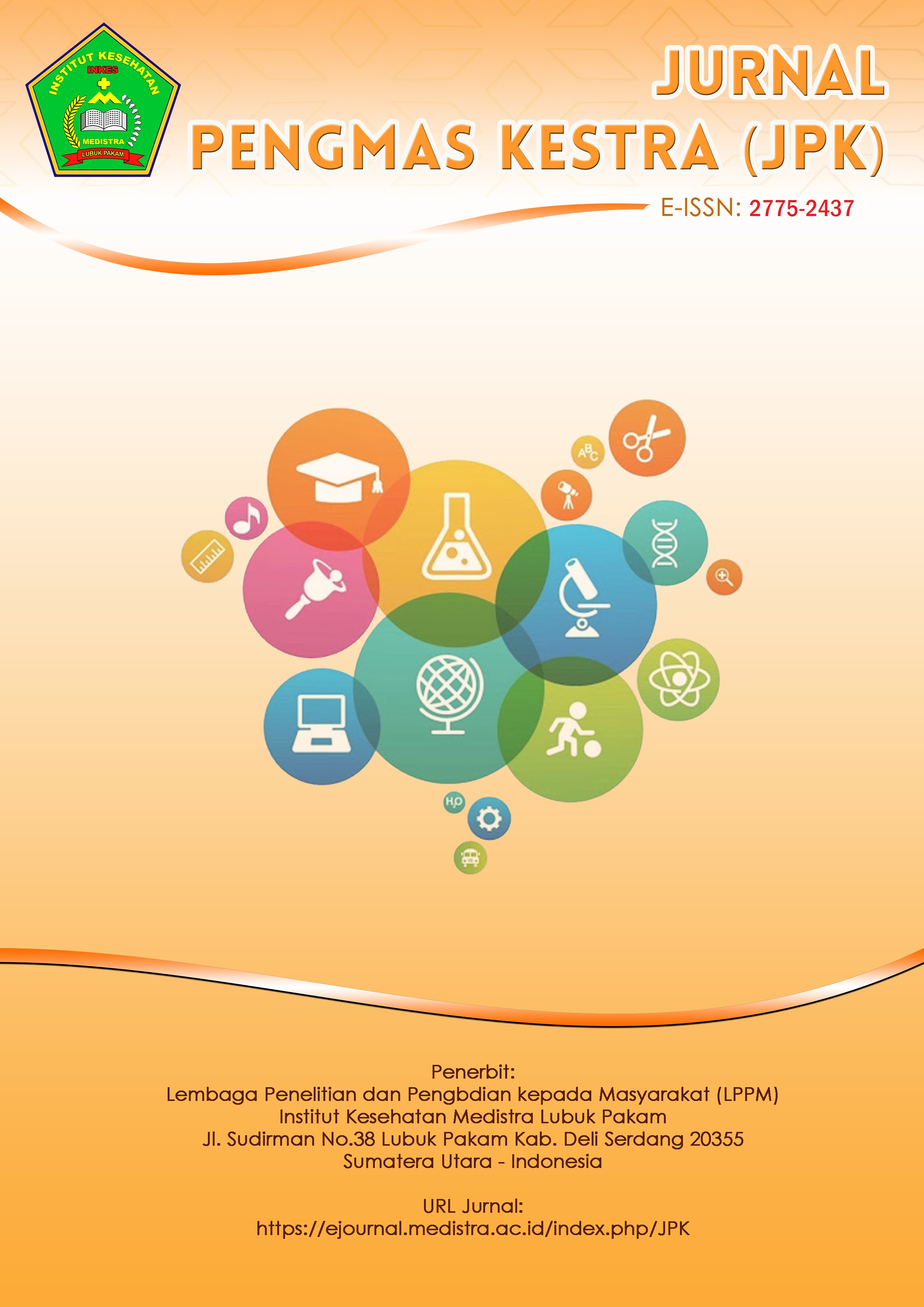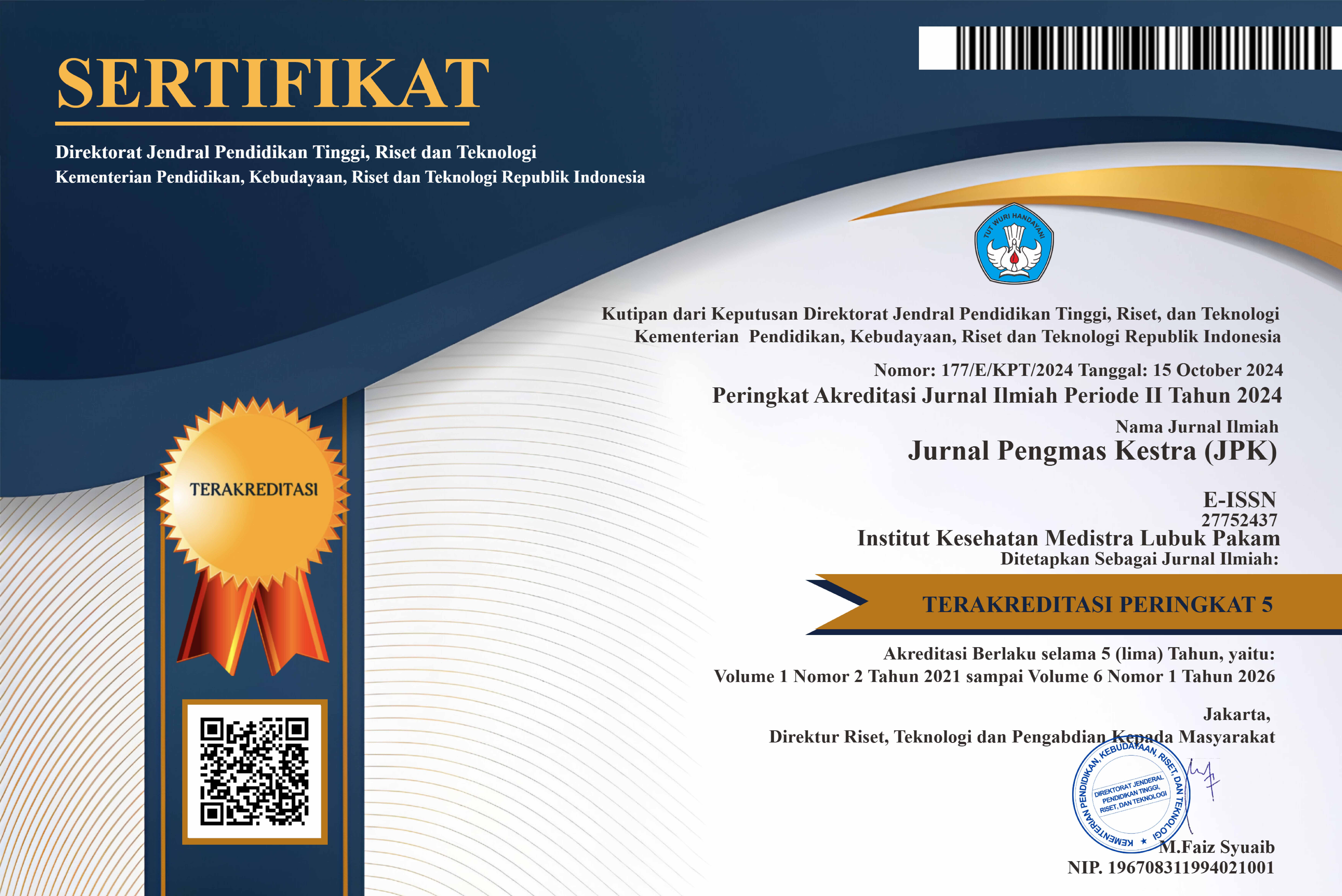Enhancing Awareness of Gastritis Risk Due to Excessive Coffee Consumption Among Generation Z at Grandmed Hospital Lubuk Pakam
DOI:
https://doi.org/10.35451/vj98h307Keywords:
Generation Z, Excessive Coffee Consumption, Awareness Enhancement, Gastritis RiskAbstract
Coffee is one of the most favored beverages globally, including in Indonesia. High work pressure and busy daily activities have encouraged increased coffee consumption, particularly among Generation Z, to maintain alertness and performance. However, excessive coffee intake may elevate the risk of gastritis. Gastritis is an inflammation of the gastric mucosa, which can be triggered by various factors, including high caffeine consumption. This Community Service (PkM) program aimed to raise awareness among Generation Z regarding the potential risk of gastritis due to uncontrolled coffee intake. The activity was conducted using a participatory educational approach, enabling participants to engage actively in the learning process. Educational content was delivered through lectures, discussions, and the distribution of informative leaflets to enhance participants’ knowledge. The activity began with a pre-test and concluded with a post-test to assess knowledge improvement. The participants consisted of Generation Z adolescents aged 17 to 25, who were visitors or interns at Grandmed Hospital, Lubuk Pakam. The results revealed that 17 participants (85%) regularly consumed at least one cup of coffee daily, and 15 participants (75%) frequently experienced gastric discomfort following coffee consumption. After the educational session, there was an average knowledge increase of 28.5 points, and 19 participants (95%) showed improved scores and expressed satisfaction with the PkM program. This community service activity has proven effective in increasing public awareness, promoting proper coffee consumption behavior, and potentially reducing the risk of gastritis.
References
[1] K. Chen and M. Li, "Global coffee consumption trends: A statistical overview," Journal of Beverage Studies, vol. 15, no. 1, pp. 10–18, Jan. 2023.
[2] S. Tanaka and L. Cheng, "Digital lifestyle and dietary behavior among Gen Z: A cross-cultural perspective," Journal of Youth and Health Promotion, vol. 10, no. 3, pp. 145–152, Jul. 2022.
[3] T. R. Baker and J. Santos, "Caffeine-induced gastritis: Clinical review and public health implications," Gastroenterology Insights, vol. 11, no. 2, pp. 78–84, Apr. 2021.
[4] Mayo Clinic, "Gastritis: Symptoms and causes," Mayo Clinic Official Website, 2022. [Online]. Available: https://www.mayoclinic.org/diseases-conditions/gastritis/symptoms-causes/. [Accessed: Jun. 20, 2025].
[5] U.S. Food and Drug Administration, "Spilling the Beans: How Much Caffeine is Too Much," FDA Consumer Health Information, 2018. [Online]. Available: https://www.fda.gov/. [Accessed: Jun. 20, 2025].
[6] C. López and A. Kumar, "Caffeine content in brewed coffee: Comparison of methods and cup sizes," Food Chemistry Research, vol. 21, no. 4, pp. 200–206, Dec. 2020.
[7] A. Smith, J. Walker, and E. Li, "Association between caffeine consumption and gastritis symptoms in adults: A population-based study," Journal of Gastrointestinal Health, vol. 14, no. 3, pp. 133–140, Sep. 2021.
[8] Y. Putri and I. Rachmawati, "Hubungan frekuensi konsumsi kopi dengan gejala dispepsia pada mahasiswa," Jurnal Kesehatan Mahardika, vol. 5, no. 2, pp. 91–97, 2020.
[9] F.Nurikhsan, W.S.Indrianie, dan D.Safitri, “Fenomena Coffee Shop di Kalangan Konsumen Remaja,” Widya Komunika, vol.9, no.2, pp.140–150, Okt. 2019. doi:10.20884/wk.v9i2.1962.
[10] E.Adriana, U.Y.Asepta, dan L.F.?Sujono, “Pengaruh Kepribadian Merek dan Pengalaman Merek terhadap Ikatan Emosional Merek Kedai Kopi,” CEMERLANG : Jurnal Manajemen dan Ekonomi Bisnis Vol.3, No.2 Mei 2023.
[11] Azzahra M, Abdurahman A.I, Alamsyah, “Fenomena Ngopi di Coffee Shop pada Gen Z” Social Science Academic, vol.1, no.2, Dec. 2023, hlm.493–506. doi: 10.37680/ssa.v1i2.3991.
[12] Anggita, N. (2015). Hubungan Faktor Konsumsi dan Karakteristik Individu dengan Persepsi Gangguan Lambung pada Mahasiswa Penderita Gangguan Lambung di Pusat Kesehatan Mahasiswa (PKM) Universitas Indonesia tahun 2011. Skripsi FKM UI, 75.
[13] Azharani, T., & Harwanto, F. (2024). Hubungan Pola Konsumsi Kopi Terhadap Penderita Gastritis Di Indonesia : Literature Review. 8, 3924–3930.
[14] Suarnianti. (2015). ‘Hubungan Antara Konsumsi Cafein Dengan Kejadian Gastritis Di RSU Islam Faisal Makassar’, Jurnal Ilmiah Kesehatan Diagnosis, Volume 3 N, pp. 8–13.
[15] Ilham, M. I., Haniarti, U. (, Program, S., Kesehatan, M., Fakultas, I., Kesehatan, U., & Muhammadiyah, P. (2019). Hubungan Pola Konsumsi Kopi Terhadap Kejadian Gastristis Pada Mahasiswa Muhammadiyah Parepare. In Januari (Vol. 1, Issue 1). http://jurnal.umpar.ac.id/index.php/makes
Downloads
Published
Issue
Section
License
Copyright (c) 2025 Anita Sri Gandaria Purba, Muhammad Reza, Yuni Suharnida, Ria Aprilia Waruwu, Syahfaradila Syahfaradila

This work is licensed under a Creative Commons Attribution 4.0 International License.
Copyright in each article is the property of the Author.




















